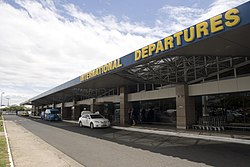Nadi Airport
| Nadi International Airport | |||||||||||||||
|---|---|---|---|---|---|---|---|---|---|---|---|---|---|---|---|
 |
|||||||||||||||
| Summary | |||||||||||||||
| Airport type | Public | ||||||||||||||
| Operator | Airports Fiji Limited (AFL) | ||||||||||||||
| Serves | Nadi | ||||||||||||||
| Location | Nadi, Viti Levu, Fiji | ||||||||||||||
| Hub for | |||||||||||||||
| Elevation AMSL | 18 m / 59 ft | ||||||||||||||
| Coordinates | 17°45′19″S 177°26′36″E / 17.75528°S 177.44333°E | ||||||||||||||
| Website | airportsfiji.com | ||||||||||||||
| Map | |||||||||||||||
| Location of airport in Fiji | |||||||||||||||
| Runways | |||||||||||||||
|
|||||||||||||||
Nadi International Airport (IATA: NAN, ICAO: NFFN) is the main international airport for the Republic of Fiji as well as an important regional hub for the South Pacific islands, located by the coast on the western side of the main island Viti Levu. It is the main hub of Fiji Airways and its domestic and regional subsidiary Fiji Link. The airport is 10 km from the city of Nadi and 20 km from the city of Lautoka. In 2014, it handled 1,984,898 passengers on international and domestic flights. It handles about 97% of international visitors to Fiji, of which are 85% tourists. Despite being Fiji's main airport, it is quite far away, about 192 kilometres (119 mi) northwest of the country's capital Suva and its airport, Nausori International Airport.
The original airstrips at Nadi were built by New Zealand from August 1939, being completed in March 1940, and were paid for by the British colonial authorities. They were extended by New Zealand from November 1941; the first 7,000 feet (2,100 m) runway was completed by January 1942 and the other two by April 1942. The work was requested by the United States of America for the South Pacific air ferry route and paid for as reverse Lend-Lease. In 1941 American engineer Leif J. Sverdrup discussed progress on the airfields with Walter Nash, then New Zealand Minister of Finance. Nash recalled Sverdrup saying that there was no formal agreement for payment for what was called Nandi Airport by America, so on the back of one of his cards Sverdrup drew a cross representing the airfield, wrote "£250,000" (pounds) and initialled it "L.J.S." The extension was actually estimated to cost £750,000 (pounds).
...
Wikipedia

